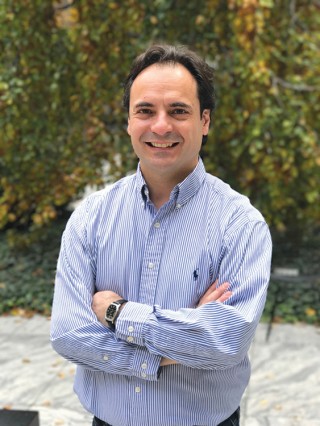Column Name
Title

José García-León
(Photo by Coralie Gallet)José García-León is from Seville, Spain, where he attended the Conservatorio Superior de Música before getting his bachelor's degree from SUNY Binghamton and his doctorate in piano performance from the Manhattan School of Music. Prior to starting at Juilliard, in 2014, he was at the College of Arts and Sciences of the University of New Haven as an associate dean and associate professor of music. He and his wife, Coralie Gallet, and their three children live in Westchester County.
Body
So you were born in Macarena (cue the '90s pop hit) …
Yes, like the song, please don't remind me! It's also one of the most historic neighborhoods in Seville—and a very common girl's name.
What's your first musical memory?
My parents noticed that about the only thing that would keep me quiet and away from banging anything I could get my hands on was to allow me to watch Spanish Radio and Television (RTVE) Symphony Orchestra concerts on TV. Apparently I was mesmerized by the idea of so many people “playing” (as in “playing with their toys”) simultaneously. So one of my earliest memories, musical or otherwise, is the amazement of watching and listening to symphony orchestras perform. That wonder has not stopped. This fixation of mine led my nonmusician parents to consider signing me up for music lessons. Many years later I realized that I never actually decided to be a musician; it never occurred to me that I could be anything else.
How do you balance your performing and administrative lives?
I wouldn't call it balance! I love making music and can't keep myself from playing, so out of necessity I find time. In the same way that I think administrators on the academic side should teach or at least remain in close contact with students, administrators in the performing arts can benefit from having a background in performance and, if possible, remain active themselves. Working on that balance is well worth the effort.
How did you get into administrative work?
Mostly by chance, but at the risk of sounding clichéd, the main motivation was that I care deeply about students and earlier in my career I realized that as much as I loved teaching, I could potentially be helpful to more students by working in administration.
Does anything continue to surprise you about Juilliard?
I'm constantly astonished by the faculty and students‘ talent and dedication. One of the biggest joys of working here is the privilege of watching the students develop as artists and attending their incredible performances.
What's your favorite vacation spot?
I have many favorites, but the top three would be Ayamonte (Southern Spain), St.-Jean-de-Luz (French Basque country), and Cinque Terre (Italy). Besides the great memories I have from each of these places, they are all stunning sea towns.
If you weren't in the career you are in, what would you be doing?
I can't envision a career removed from music or the performing arts. But if I had to choose a different path, the one thing that attracts me almost as much is creative writing.
What are your nonmusic interests?
You wouldn't know it by how I look, but I love endurance sports, especially long-distance running and cycling. I maintain 10(!) very active library memberships. And even though I've been named “worst player of the century” twice running, I am crazy about chess.
What would surprise people about you?
My pancakes are the stuff of legend! I'm an obsessive follower of Formula 1 racing. And I've unintentionally become somewhat of an expert on Swedish crime fiction—in French. If I were to visit Sweden I would be shocked to discover that Swedish detectives don't speak French to each other.
What else are you reading?
Recently, I finished Toni Morrison's complete works (huge fan). I'm thoroughly enjoying Fredrik Backman's comfort-food-esque A Man Called Ove. Next, I'll be tackling Radiohead and the Resistant Concept Album by Marianne Tatom Letts.
If you could grant one wish to all Juilliard students, what would it be?
That's easy: that they achieve their full potential—that's what drives us every day.




